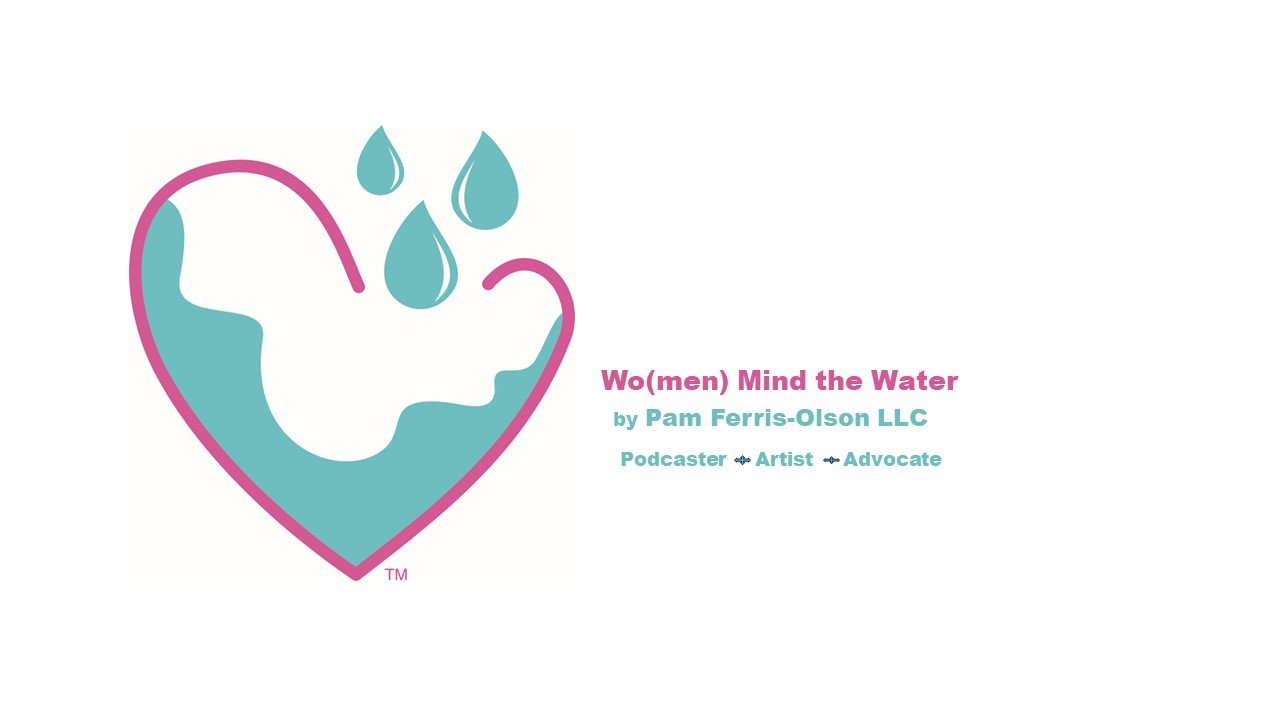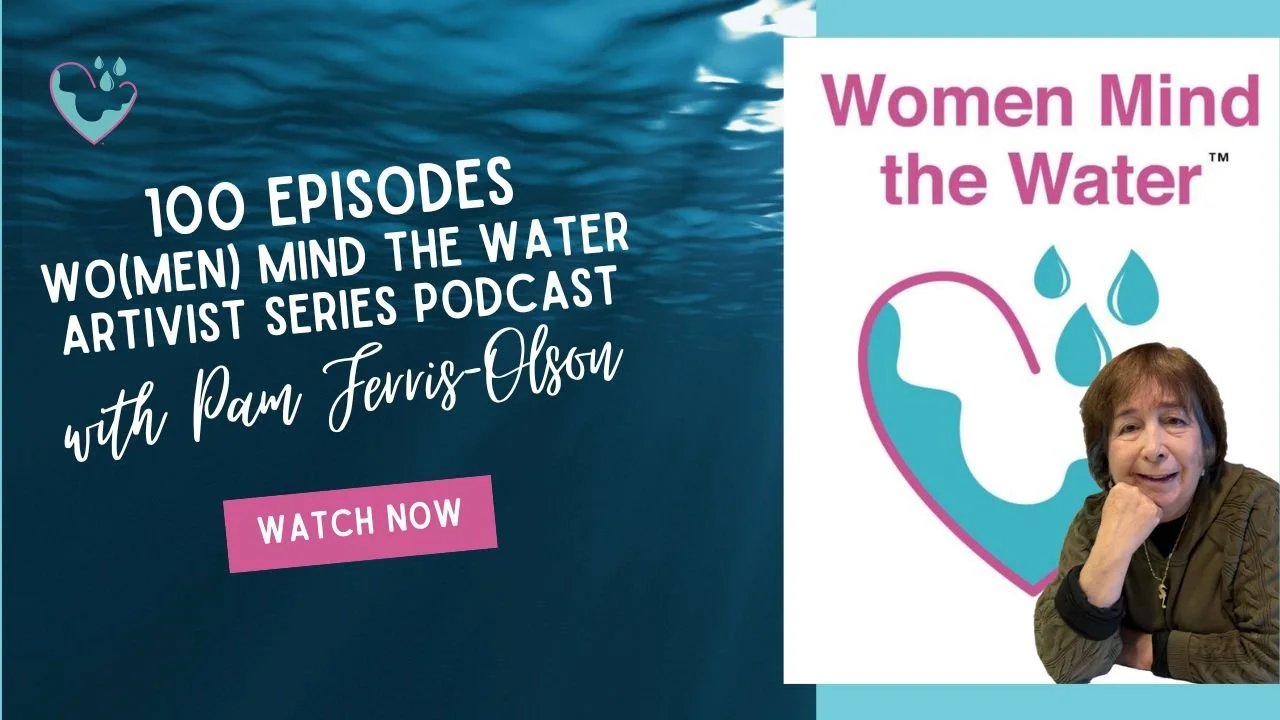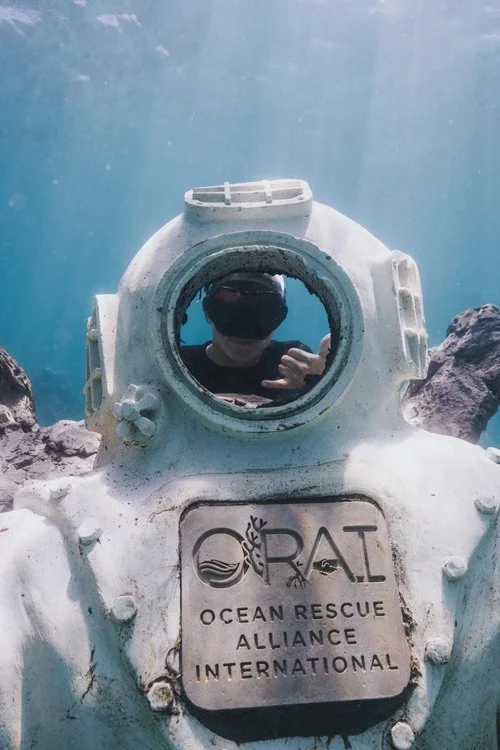100th Anniversary Podcast with host Pam Ferris-Olson
100 episodes globally produced podcast of ocean art/ artist interview, marine conservation theme. Podcaster discusses podcast production, shares personal stories
Patrizia Zelano
Patrizia Zolano, an acclaimed Italian photographer, invites viewers to look beyond the immediacy of the image. Her series inspired by the 2019 flood in Venice share images of destruction and transformation.
Parisa Golchoubian
Artistic entrepreneur Parisa Golchoubian is a global nomad. She creates art, represents other artists, and has tech startup designed to solve marine plastic pollution. She talks about art, storytelling, AI, and technology.
Sophie Maycock
Sophie Maycock, shark research/conservationist, website SharkSpeak , author Shark: The illustrated biography, guest Wo(men) Mind the Water Artivist Series podcast on womenmindthewater.com, UK representative Sharks Educational Institute.
Shelby Thomas
Shelby Thomas, Ocean Rescue Alliance International, restores marine ecosystems. The non-profit has installed more than 300 modules, some in the form of mermaids, as living reefs off southern Florida. They are ideal spots for coral restoration, marine life, research and tourism. Shelby is the latest guest on the Wo(men) Mind the Water Artivist Series on womenmindthewater.com.
Susan Baur
Susan Baur is founder of Old Ladies Against Underwater Garbage, a group of women aged 64 and up that dive for sunken garbage in ponds. Their work restores the ponds and enhances the lives of the women. It’s physically demanding work but the women are rewarded with camaraderie, self-satisfaction, and cookies.
Lily Niederhofer
Lily Niederhofer, competitive swimmer/octopus advocate, conceived open-water swim, to raise awareness /money, to stop world’s first industrial-sized octopus farm. The preteen speaks to students and lawmakers hoping to block commercial octopus operations. Wo(men) Mind the Water Artivist Podcast series speaks with the Lewis Pugh Foundation Environmental Sports Champion and Young Planet Leader.
Arielle Moody
Arielle Moody worked in the beauty industry for more than 15 years, before she started her own company. Mama Sol was a collaboration between three women who wanted to protect themselves, their children, and the planet from the harmful petrochemicals found in many commercially available sunscreens. Mama Sol’s tagline is: “For all mamas, Mother Earth included.” In addition to protecting the skin from the harmful rays of the sun, the sunscreens are also less harmful to coral reefs. Important because it has been estimated, that roughly one fifth of the world’s coral have died in the past three years.
Jada Alexander
Jada Alexander has a deep reverence for the ocean. Her personal journey as a young Black woman left her with emotional scars. She has come to understand that the ocean is more than a place to surf. Jada is the founder of the Daybreak Beach Club. Daybreak teaches participants to enjoy, respect and protect the ocean while discovering that the ocean provides a path to healing and personal growth.
Indira Brooks
Indira Brook, the latest guest on the Wo(men) Mind the Water Artivist Series podcast, is a manager at Roatán Marine Park. The marine park is a non-profit dedicated to the protection of the Caribbean island located about 40 miles off the northern coast of Honduras. Indira’s work for the Roatán Marine Park involves working with people to protect coral reefs, mangroves and other marine species. Roatán’s coral reefs are second only in size to Australia's Great Barrier Reef. Indira is currently working with others to institute an island-wide ban of sunscreens containing petrochemicals. Coral bleaching and deformity in the development of fish are attributable to the petrochemicals in sunscreen. (https://womenmindthewater.com/featured-guests)
Kathryn Pharr
Kathryn Pharr is the leader of a global community of women who focus on issues related to water. Kathryn believes that water is a source for female empowerment. She founded the Community of Women in Water as a global network which now counts more than 1000 members. Their focus is empowering women who work professionally in WASH (i.e., water, sanitation and hygiene). The Community of Women in Water want women to be leaders in WASH on the local to global levels.
Manuela Zoninsein
Manuela Zoninsein began as a journalist in China. While there, she witnessed a shift from reusable to single-use water bottles. The Brazilian-American’s love for beaches in Rio de Janeiro and her studies at MIT-Sloan Executive MBA program, led her to start Kadeya, a company that aims to replace single-use plastic bottles with an innovative vending machine that reduces plastic consumption.
Sophie Guarasci
Sophie Guarasci worked in the world of fashion and finance before becoming a licensed veterinary tech. She works at the Marine Mammal Center, the nation’s foremost marine mammal hospital located just north of San Francisco. Sophie oversees the clinical and surgical treatment and husbandry of seals, sea lions, and sea otters. It’s her dream job, even though there are times she has to make difficult decisions about the treatment of severely ill animals. Sophie believes that people wherever they live should care about these marine animals as they tell us much about what is going on out there in their home the ocean, which is tied to human health. And for her, every time the Center is able to release an animal back into the ocean, Sophie feels hope that she is making a difference.
Angela Abshier
Angela grew up in Wyoming and originally went college to be study journalism but pivoted to law when she heard about Napster and the potential it had for dispossessing musical artists from their artistic property. Angela believes that when a system is broken and you have an idea of how to fix it or change it or make it better, it’s worth it to step in and make it happen. After she was introduced to sailing and she saw the massive super yachts with their huge sails, her creative mind took hold. She learned that some of the material is extraordinary and yet it had a limited life span. She wanted to make a positive difference with the decommissioned sails that otherwise ended up as landfill. Angela has invested her own human capital and worked with architects and others to find ways to use the sails for humanitarian purposes. One of the first projects for Sail to Shelter is installing sails in Maui to answer a number of different issues. Maui suffered a devastating fire in August 2023,
Bonnie Monteleone
Bonnie Montelone is a researcher, environmental science-educator, film maker, artist, and co-founder of the Plastic Ocean Project, a non-profit seeking science-based solutions to the global plastic pollution crisis. Bonnie has collected marine plastic on a global scale. She is affiliated with the Environmental Studies Department at the University of North Carolina Wilmington where she works as an Adjunct Instructor of Plastic Marine Debris Field Studies. She also serves as an advisor for students conducting research on marine plastic. Additionally, Bonnie is an artist who uses the plastic she’s collects to create visual stories about her research.
Tracy Metz
Tracy Metz is a journalist, author and podcast maker. She also is the director of the John Adams Institute, an independent foundation in the Netherlands, that brings the best and the brightest of American thinking to the Netherlands. Tracy is passionate about the interplay between urban issues, architecture, and the natural environment, particularly water. Her book Sweet&Salt: Water and the Dutch, investigates the change in the country’s approach to water management in times of climate change. Her podcast Water Talks addresses global issues with water – too much, too little, too dirty and too unequal. Water Talks grew out of the United Nations conference on water held in NYC in March 2023.
Kara Dodge
Kara Dodge is a research scientist at the Anderson Cabot Center for Ocean Research, the research arm of the New England Aquarium in Boston. Her specialty is the ecology of marine animals, more specifically sea turtles. Kara uses cutting-edge technology like satellite tagging and drones to enrich our knowledge of sea turtles and the impacts of humans on them.
Hoku Cody
Hoku Cody, a Native Hawaiian, seabird biologist, and life-long ocean lover, protector, and advocate advocates for community stewardship in actions, that revitalize traditional rights within Hawaiʻi’s natural and cultural resource management industries. Hoku works with the National Ocean Protection Coalition to create and support marine protected areas and have the Pacific Remote Islands designated a National Marine Sanctuary.
Vicki Nichols Goldstein
Vicki Nichols Goldstein is the latest guest on the Women Mind the Water Artivist Series podcast. Vicki is founder of the Inland Ocean Coalition. Her impressive credentials include a master’s degree in marine policy from Yale University and working with the National Oceanic and Atmospheric Administration to co-write documents for the designation of the Monterey Bay National Marine Sanctuary. Vicki served as the Executive Director of the California-based Save Our Shores. When she moved to Colorado, she founded the Colorado Ocean Coalition and in 2017 Vicki rebranded it as the Inland Ocean Coalition. Inland Ocean Coalition empowers citizens wherever they live to be leaders and make positive contributions to ocean protection.
Rebecca Rutstein
Rebecca Rutstein, an accomplished artist who has received many awards and been involved in numerous public exhibitions, is the latest guest on Women Mind the Water Artivist Series Podcast (womenmindthewater.com/featured-guests). Rebecca’s career has taken her to remarkable places including the high seas and the ocean floor. In all, her artwork strives to build connections with nature, inspire wonder, and foster environmental stewardship.




















